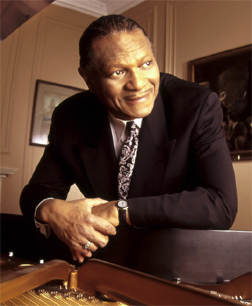MCCOY TYNER: Communicating Sensitivity

Age truly is a state of mind. One need look no further than jazz pianist McCoy Tyner for definitive proof. Now in his seventies, Tyner still possesses an unquenchable thirst for exploration and innovation. He’s released dozens of albums across a six-decade career that have expanded the boundaries of his instrument and influenced untold numbers of players and composers. What all of his diverse recordings have in common is the presence of his signature blues-influenced piano approach marked by an inventive combination of sophisticated chords and an exhilarating, percussive touch.
What are the key philosophies you adhere to as a bandleader?
I like to provide enough room so the musician is comfortable to do what they do. I don’t like to handcuff people. But at the same time, he’s got to understand that when he’s playing with me, he also has to listen. Listening and responding are very important. It’s also about the respect you command without being demanding. The bandleader has to understand the musician enough that he feels comfortable in his presence, but at the same time gives the player the props he deserves—if he justly deserve thems. I haven’t had much problem with my big band that has 14 guys onstage. If they don’t want to be there, it’s difficult to get music out of them. [laughs]
You’re known as a soft-spoken, amiable individual. However, I imagine there’s a more fiery side that emerges when dealing with a musician who’s not up to par.
[laughs] Oh yeah! If necessary, yeah. Fortunately, I haven’t been challenged that way too many times, but occasionally I have. The human element is ever-present when dealing with people. But I’ve had lots of people work for me and they never say “Wow, that was an experience I won’t repeat.” I get the opposite response. I’ve talked to Woody Herman, Maynard Ferguson and others. I’ve learned so much about the big band situation and the same things apply in general to small groups too. You learn not only to give respect but how to have that respect come back to you. It’s a reciprocal thing. And I think that’s a very important lesson for a guy who gets up on stage. If it’s all about him, that’s not playing music. If he’s not listening and responding and having respect for the other people on that stage, how can you make music? Just by thinking about yourself? It doesn’t go that way. And if you have your own band, you’ve got to be able to communicate with people on a human level. That enhances the musical side.
How firmly is jazz being instilled in the American public’s collective mindset as a classical art form today?
It’s not like it was in the past because of the fact that radio and various other media seem to focus on the very mediocre. It’s not that we don’t have the music or that it isn’t being played on our level. But what’s being played on the radio represents choices that are very, very limited. You have choices, but there is so much going on. It’s an onslaught of stuff and sometimes someone might not know what jazz is. Some people will say it’s this or that. Jazz is a very deeprooted music. You can’t fluff it off like it just happened yesterday. The bottom line is sales. And you’re competing with pop artists or you’re not being marketed. Jazz has never been properly marketed because it’s a classical form of music—it really is. So that limits it to a category and they don’t want to pay attention.
The music needs to be accessible. I’ll give you an example. My mother knew who Billie Holiday, Count Basie and Duke Ellington were. She knew who they were because they were part of the community and we were proud of these people. That kind of accessibility doesn’t seem to exist at that level anymore—the level where the average housewife or plumber or carpenter is aware of this music. I remember getting on a bus in Chicago one time and the bus driver said “Oh, you’re with Coltrane! You’re in town? I’m coming to see you!” That was the bus driver! The music was so accessible. We had our fair share of airtime. But now the market is so flooded with stuff that’s not on the same quality level, but it sells.
Have you visited the John Coltrane African Orthodox Church in San Francisco?
I haven’t, but I know what you’re talking about. The thing is, if people want to do that, it’s fine. Knowing John, I don’t know if he would want to be in that kind of position. If you look at his music, quite naturally there were religious elements. He was definitely a very spiritual person. His grandfather was a minister, so he grew up a part of the church. But I think John would be kind of uncomfortable. I don’t think he’d want to be a deity in that respect. He was a very, very subtle, quiet and regal person. He was very nice and a very good man to work for. He was like abig brother. I was a kid when I first met and played for him. I was 17 years old. We were like family and that’s how I looked at it. I loved working with John. I loved him as a person. He’ll always have an influence on me. That was my university. He was very, very generous in terms of allowing us to have an opportunity to develop. I love the music we created a lot. But if people feel as if they want to deify him and make a saint of him or whatever, that’s up to them. I don’t necessarily want to be part of that because I knew him differently.


No Comments comments associated with this post